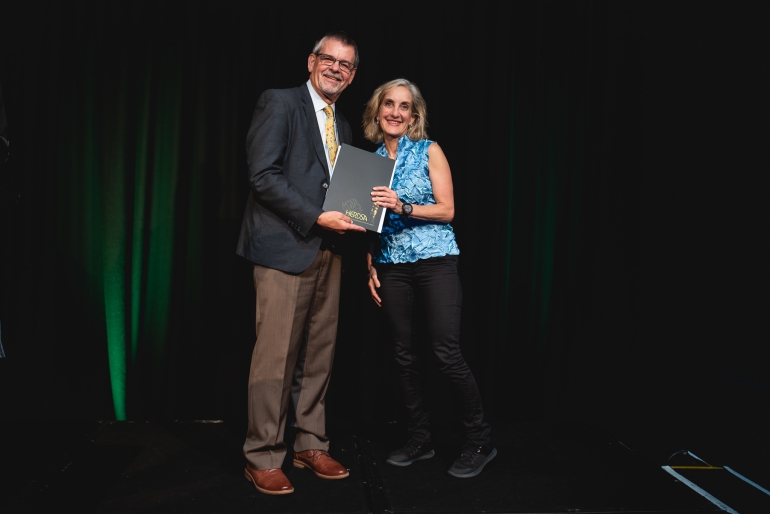Congratulations to Associate Professor Adrienne Torda, who has been made a fellow of the Higher Education Research and Development Society of Australasia (HERDSA). The fellowship was formally awarded at this year's conference on 2-5 July 2019, in Auckland, New Zealand.
Adrienne is the Associate Dean (Education) in UNSW Medicine, a leader in medical education and an educational innovator. She has won the 2017 UNSW Medicine Award for Excellence in Teaching.
Having a special interest in educational innovation, Adrienne has developed ways of incorporating digital innovations into teaching medical students, including online learning tools. She has also co-developed executive education programs for development of other academics and has taught medical educators internationally.
Watch Adrienne talk about her Education Focussed experience
Adrienne is also a senior clinician at Prince of Wales hospital, specialising in Infectious Diseases. Her main areas of clinical research include immunisation, antibiotic allergies, prevention of cellulitis and prosthetic joint infections.
In 2019-2020, Adrienne was appointed UNSW Gender Diversity co-Champion.
Now in her own words, Adrienne shares why becoming a HERDSA Fellow is important to her and what makes her teaching great.
Why is the HERDSA fellowship important for you?
Last year, I did a great deal of work in the Fellowship space to improve my teaching and leadership skills and my self-awareness as a professional educator. This was the third and hardest educational fellowship that I was awarded. It involved a mentorship that lasted over a year and required me to critically reflect on many aspects of my teaching, such as how I support learning, how I recognise the needs of different participants, how I have introduced innovation to enhance learning and how I use assessments. Not only did I need to reflect on my teaching practise, I also needed to supply good evidence of this.
It was quite hard work, but I knew that the standard required would really help me improve the quality of my educational practice.
What makes your teaching exceptional?
I think that my teaching is very student-centred, dynamic and innovative. My teaching philosophy focuses on students and incorporates role modelling, mentoring and dialogue with students.
I am passionate about excellence in teaching and constantly trying to improve teaching deliverables for our students. I also love to listen to their needs and then adapt, innovate and create educational deliverables that meet these needs. Over the past few years I have worked quite strongly in digital innovation, and I’ve produced several high-quality online innovations that the students have loved and which have supported their learning in many ways. I also have a unique placement in the medicine faculty, in that I teach across all the years, from campus to clinical. This allows me to develop teaching deliverables to match their transition in both place and maturity.
How does the fellowship enhance your teaching?
I think that doing this fellowship really helped me develop my critical reflection skills in a practical way and apply it to my teaching. It made me think about things like - what was the evidence about whether innovations were successful or not? How will I use this evidence moving forward?
I think that having the ability to think about what you have done, look at the evidence around its impact (evaluation) and then work out how you will incorporate this information moving forward, is vital to being a great teacher. It means that my teaching will be in a constant state of improvement!
Essentially it mirrors what we are constantly asking our own students to do - reflect on their learning and incorporate this into their practice moving forward.
What do you look forward to next?
I have many innovative ideas and projects in the pipeline. I am still creating several innovative clinical modules using VR to enhance the clinical learning of the Phase 3 students, and I am constantly looking at ways to tweak and improve my courses in Phase 1.
Soon, I am also hoping to create and offer some innovative educational deliverables to our clinical teachers (particularly our conjoint teachers) to help them develop their teaching skills in the clinical environment. Over the next 10 years as our workplace becomes increasingly digitised, the necessary skills of our medical graduates will change dramatically. The format and content of the medical program will need to undergo change to support this. I am looking forward to being involved in this.
Interview copy provided by Christina Kingen (Internal Communications, Division of External Relations)
